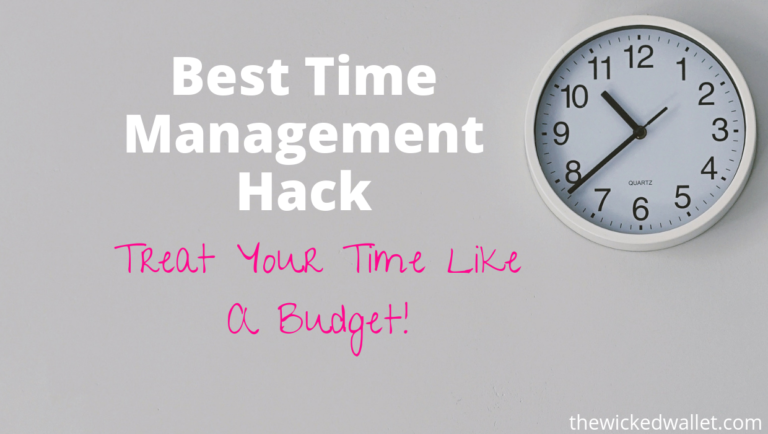There are quite a bit of blog posts out there, even on this very blog, that talk about the importance of budgeting your money. They state that tracking your dollars and knowing where your money is going is the first step in becoming financially free.
But what about your time?
Do you know where your time is going? So often, people generalize their time spent on tasks. They have no real conception of where their time is truly spent. I was among them. I always felt busy, rushed and my mind was preeeeetty chaotic.
Working full-time, running a couple new businesses and being a dog mom is a lot of work… right?
I always felt too busy, too stressed and no matter what, unproductive. I was never crossing enough items off my ever-expanding to do list. Until something I read…
Enter: 168 Hours.
168 Hours is a book by Laura Vanderkam. It’s focus is proving to the reader how much time they really have in a week. She offers a challenge of tracking your time for a full week in 15 minute increments.
Sounds crazy and like a lot of work? I thought so too. Until I completed the challenge and was astonished with my results.
I was spending far more time than I expected on small mindless tasks as a form of procrastination it seemed. I would pick up dog toys, fold some laundry and clean out my car before getting to any real meaningful work.
Vanderkam discusses the idea that people often overestimate how long tasks they don’t enjoy take and underestimate the amount of time tasks they do enjoy take. For example, people will assume they are spending far more time cleaning the bathroom, doing the dishes or vacuuming than they are on Facebook, Instagram or watching TV.
Her fix for this?
Intentional Prioritization.
Your schedule should at first only include items that cannot be outsourced. This would include anything like working out, showering, family time, etc. These items need to be completed first every single day and can only be completed by you.
Then, once you have completed all tasks that cannot be outsourced, you can start adding on additional tasks that are able to be outsourced. Things like cleaning the bathroom, doing the laundry and grocery shopping.
This even means scheduling in meditation, rest and any other self-care. She mentions that intentional relaxation is necessary for productivity. This means taking walking breaks and stretching when needed. You should never feel bad about not being busy.
Click here to buy your copy of 168 Hours, it’s worth the read 🙂
Helpful Tidbits
Be Accountable: This is necessary for the challenge to work. You need to be writing down what you are doing and be consistent with it.
No, that doesn’t mean waking up every 15 minutes in the night to write down “slept” but it does mean writing down every 15 minutes that you spend being unproductive. It is eye-opening to see how quickly time can be wasted on such mindless tasks.
Take Breaks: You need breaks to maintain peak productivity. If you don’t intentionally take a break, your brain is going to take one for you (i.e. zoning off, social media, etc.).
Go for a walk. Stretch it out. Anything to help you forget about what you were doing and let your mind take a breather.
Stop Multitasking: Focus on one task at a time. This only got easier for my as I continued to track my time. Devoting time to individual tasks so your bandwidth does not have to be split is far more efficient than trying to finish multiple things at once.
When you start tracking your time, try blocking off a couple increments for individual tasks and completing them by the time the time slot if up. It will surprise you how motivating this can be.
And remember – don’t feel guilty about time spent relaxing!
How to Track
I mean, it is truly up to you. But there are a couple options when it comes to actually tracking your time.
- Excel file Since most of my day is spent on a computer, this made the most sense for me (click the button below for a copy of my tracker).
- Apps. Toggl and Time Doctor seem to have great reviews. I did not use them for this because picking up my phone is more of a distraction for me. However, if this seems up your alley then go for it!
- Pen and Paper! If you don’t spend a lot of time on the computer, this might be best since opening a computer may cause distractions.
My Interpretation
What really helped me the most with this concept was visualizing my time as my budget. Time is our most precious resource right? It is nonrenewable. We cannot work harder and create more, we cannot buy more, we get what we get.
So why don’t we put more focus on where we are spending every minute? No, I am no longer a fan of zero-based budgeting and tracking pennies however I do believe it is a great first step for anyone looking to get a grasp on their finances. Why not try this for our time?
This will work like an audit on your time. Where is the majority of your time going? Are you happy with that investment? Does it align with your goals? If not, are you willing to change that?
Your time audit results will shock you. I swear, you won’t even realize how much time you really have until you try this. Audit your time and reset your time budget so that it reflects your goals.
When I approached this challenge from a Time Budget point of view, it really helped me stay accountable and intentional with my time.
Final Thoughts
Whether you start tracking 15 minutes of your day or even a couple hours, you should at least try. Productivity is something everyone is always striving to be 100% at. Give yourself the time audit. See where the holes lie and fill them with more intentional uses of that time.
Remember, that doesn’t mean you always have to feel busy but it does mean spending your time wisely.
Thank you for sticking around! Please let me know if you have completed this challenge or one similar in the comments below. 🙂
Looking for some more great reads? Check these out:



